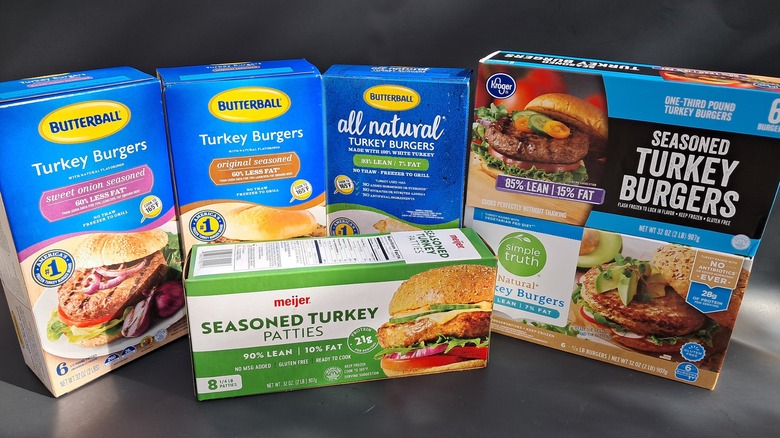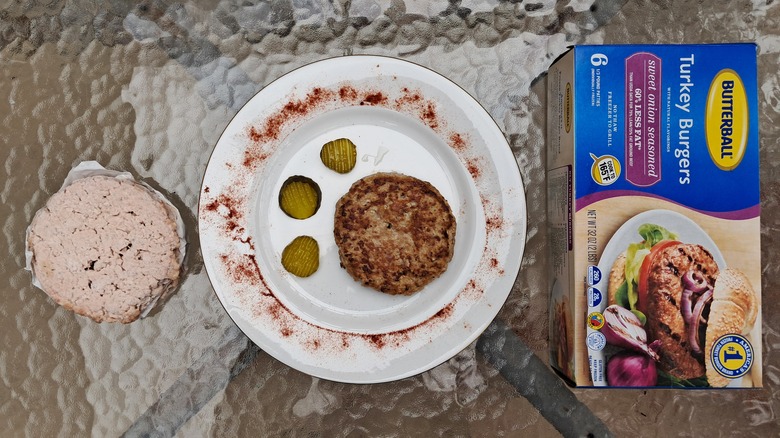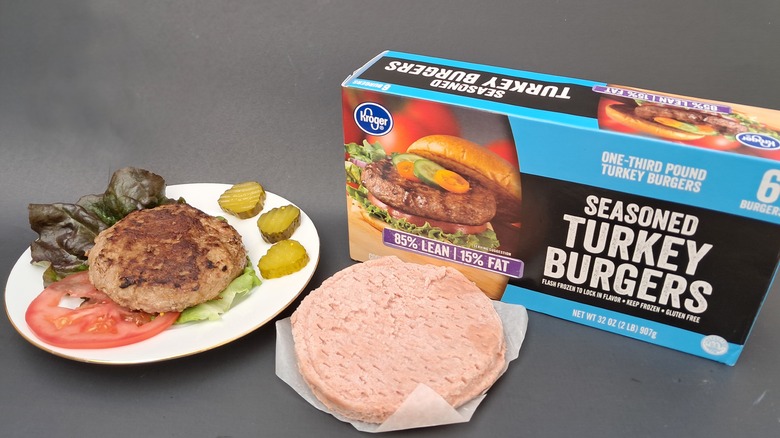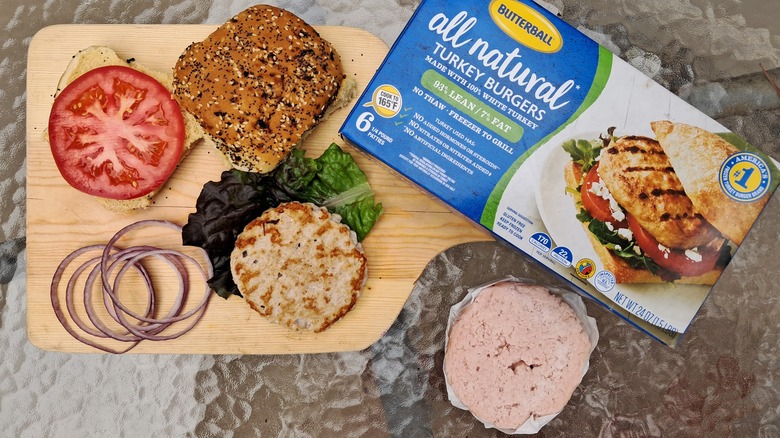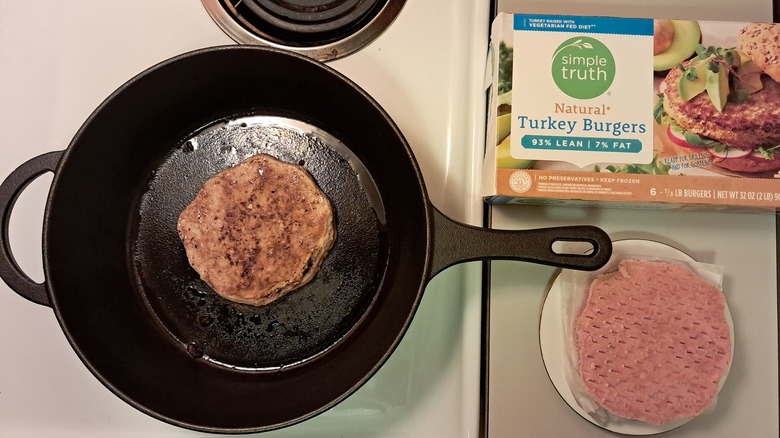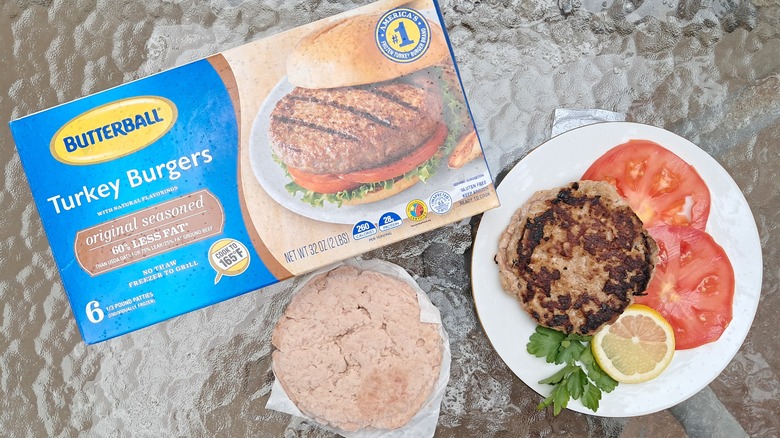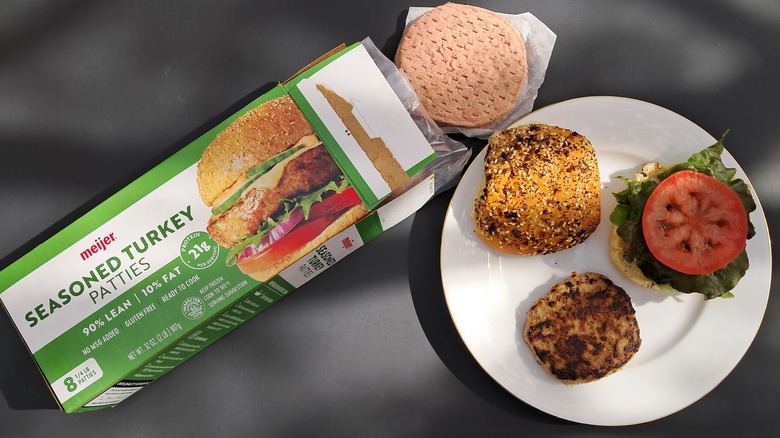Frozen Turkey Burgers, Ranked Worst To Best
You're considering making turkey burgers for dinner, but you're having trouble picking a box from the supermarket freezer. You see flavorings like seasoned, sweet onion, and natural. Then, you notice one package's lean-to-fat percentage, which leaves you wondering which numbers are best. To complicate matters further, some burgers may be low in fat, but that doesn't mean they're low in sodium. You also spot the American Humane seal on one box, showcasing the company's dedication to animal welfare, but do the other brands care about their turkeys? Which label should you choose?
People's reasons for eating turkey burgers abound, and yours may determine the brand you buy. If you just love their taste and how easy they are to make, you'll likely pick a different variety than if you're on a specific diet. Alternatively, you might focus more on animal welfare or the carbon footprint of turkey farming rather than price.
I've reviewed a selection of widely available frozen turkey burgers for price, taste, and texture. Check out my methodology at the end of this article if you want to know more about my testing procedures and how I selected brands to try. The prices in this article are accurate for a specific time and location, but they may vary depending on your local grocery store and when you shop there.
Butterball Sweet Onion Turkey Burgers
Problems with packaging, an unpleasant aftertaste, and crumbly patties were the factors that put Butterball Sweet Onion Turkey Burgers at the bottom of this ranking. These patties have an attractive profile initially, but leave an unpleasant aftertaste in your mouth for about a quarter of an hour afterward. A more serious problem with this product, though, is that pieces of the paper separators from between the burgers stay stuck on the patties. That means home cooks need to check each burger carefully before cooking and must tediously pick off bits of paper if necessary. Unfortunately, this was true across all of Butterball's turkey burger products. Finally, these sweet onion patties seemed to be more loosely stuck together than other varieties. This made it more difficult to flip them over and occasionally caused bits to fall off.
The nutrition facts say a single one of these burgers contains 450 milligrams of sodium. That's the second-highest value on this list. The box doesn't clearly state the percentage of lean and fat, but if you calculate it by dividing the fat in the burger — 11 grams — by the total weight of a patty — 151 grams — that gives you a little more than 7% fat, making these burgers some of the leanest. The American Humane seal on this box (and all Butterball products) means that the turkeys butchered to make them were raised under kinder conditions than other poultry.
Kroger Seasoned Turkey Burger
Kroger Seasoned Turkey Burgers are one of the most strongly flavored and most fatty patties in this article. The seasoning is on the overwhelming side and they taste very salty, making them less attractive than the competition. In part, this strong salty flavor is because of a sodium content of 410 milligrams per burger, but also due to the presence of the flavor enhancer disodium guanylate, often used to intensify taste. Like the majority of the products on this list, they also contain dextrose, a humectant to keep turkey burgers moist. Then, even though turkey generally has the reputation of being low in fat, this specific product doesn't meet the USDA's definition of lean meat. The government agency says products labeled as such can contain only 10% fat or less. These patties are 85% lean and 15% fat. That's not bad, but if you're buying them because you're on a low-fat, low-cholesterol diet, you might prefer a variety that's 93% lean.
A two-pound box of six burgers costs around $8 normally and $7 if you find it on sale. Each patty costs around $1.30 with a per-ounce price of about $.25. This is one of the lowest-priced turkey burgers you'll find in grocery stores. If you enjoy the taste of this product and don't need to follow a special diet, stock up your freezer with Kroger's turkey burgers next time the grocery chain marks them down.
Butterball All Natural Turkey Burgers
The taste of Butterball All Natural Turkey Burgers is slightly marred because the box they come in feels a little deceptive. That along with their higher price earned them a lower ranking. First, the package is the same size as the alternatives, so it seems like you're getting the same amount. That's not the case, though. This pack weighs a pound and a half instead of two — each burger is a quarter pound instead of a third and there are six patties. The lean and fat percentages are attractive at 93% and 7% respectively, but the sodium content is worrisome. Each 112-gram burger contains 270 milligrams. At first glance, that looks lower than other similar products, but since the patties are smaller, there's actually more sodium per gram here than in several other burgers, including Kroger's store brand. The ingredient list, on the other hand, is simple and straightforward with just three items: turkey, flavoring, and salt.
A box of this Butterball product costs the same as the flavored versions by the same company. The price for all three is nearly $11 at Walmart. The per-ounce price for the natural turkey burgers is higher, though, at about $.45 versus $.33. If you don't mind spending more and are on a low-fat diet, these burgers are for you. That higher price is worth it if you're worried animal welfare too — you'll find the American Humane seal on this box.
Simple Truth Natural Turkey Burgers
Simple Truth Natural Turkey Burgers are in the top half of this list for health reasons and price, not taste. They're 93% lean and 7% fat, resulting in a leaner, drier product. They contain just two ingredients: turkey and rosemary extract. The low amount of sodium in them — 100 milligrams per serving — makes them perfect for anyone on a special diet. Unfortunately, none of these characteristics add much flavor. On the other hand, the lack of taste is like an invitation to season these turkey burgers. You might decide to add olive oil, cumin, and lime on top to boost the flavor. Putting a pinch of salt on there is a possibility as well. Just remember, everything you add will have an impact on the nutritional value.
A box of Simple Truth patties contains six burgers, each weighing a third of a pound for a total weight of two pounds. You'll generally purchase this product at Kroger for around $12, but may find it on sale for about $10. At $2 per patty (nearly $.40 per ounce), these burgers have a comparable price to big names. You won't find the American Humane seal on Simple Truth's box, so the company likely doesn't adhere to the highest standards of animal welfare. On the other hand, Kroger asks its whole supply chain to respect an animal welfare policy. Suppliers who don't currently comply must work to improve before 2025.
Butterball Original Seasoned Turkey Burgers
Butterball's Original Seasoned Turkey Burgers are the product that sets the standard for what these poultry patties should taste like. They're flavorful and moist. The texture is soft and easy to eat and they taste wonderful in a sandwich. This is the burger that other companies, like Meijer and Kroger, set out to copy. They only took second place because of their higher price.
If you're looking for the healthiest turkey burger of all, this isn't it, though. While they qualify as lean, these burgers still have more than 7% fat. The box doesn't clarify that, but you can figure it out using the nutrition facts. Then the amount of salt in them is worrisome. Each 151-gram patty contains 510 milligrams of sodium. That's the highest of all the burgers in this article.
A box of these original turkey burgers goes for $10.72 at Walmart. That's not a bad per-ounce price at just over $.30, but you can find very similar products for less. Paying a little more might be worth it if you like Butterball's dedication to maintaining the American Humane certification that appears on all its boxes, however.
Meijer Seasoned Turkey Patties
Meijer's store-brand seasoned turkey patties stood out against the competition because they're some of the cheapest burgers, but also taste the best. Eating these patties is pleasant — they're moist and tender with a subtle seasoned flavor of fennel, thyme, and sage, similar to name brands. These patties make a fabulous sandwich when you add some mayonnaise and guacamole along with tomatoes and lettuce. The box weighs the same as most of the competition, two pounds, but contains eight patties instead of six. That means each burger is a quarter pound instead of a third. That's convenient because it's easier and faster to cook through. You can fit more on a grill and this size is better for kids as well.
The nutrition facts for these patties are pretty standard. They aren't the leanest or fattiest and they're salty, but less salty than some other varieties. The box clearly states these are 90% lean and each patty contains about 280 milligrams of salt. That looks lower than the competition, but remember that they're also smaller so they've got more sodium per gram.
The price is one of the lowest you'll find for turkey burgers. A box of eight at regular price costs around $8. It weighs two pounds, putting the per-ounce price at about $.25. Name brands are more expensive and have comparable ingredients and taste. That makes this the most attractive box of turkey burgers you can buy.
Methodology
Finding turkey burgers to review started with an internet search. The result showed my local Walmart, Meijer, and Kroger each stocked between two and three types of turkey burgers. I added the available patties to my list and grabbed my shopping bag. Walmart had a lower regular price than Meijer and Kroger for the Butterball brand by $2-$4 per box. On sale, though, you may find these patties at most supermarkets for around $10 a box. Applegate and Jenny-O were two big brands absent from my area. Shoppers may find Jenny-O at Hy-vee or Safeway, while Applegate burgers appear on shelves of smaller regional grocery store chains like King's in New Jersey.
For the taste test, I cooked each patty the same way. I heated my cast iron pan to medium, sprayed it with PAM, and added a single, still-frozen burger. Once cooked, I tried a few bites plain, paying attention to the texture, dryness, moisture, and tenderness. Then I added the rest of the patty to a bun with mayo, tomato, and lettuce. For taste, I judged the intensity of the seasoning as well as the saltiness. Every turkey burger I reviewed had a pleasant flavor and texture. I ultimately ranked them according to which flavor I liked most combined with which burger was the best deal, but I consider every product on this list a worthwhile purchase.
